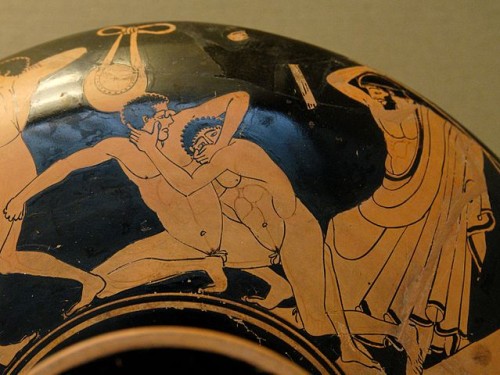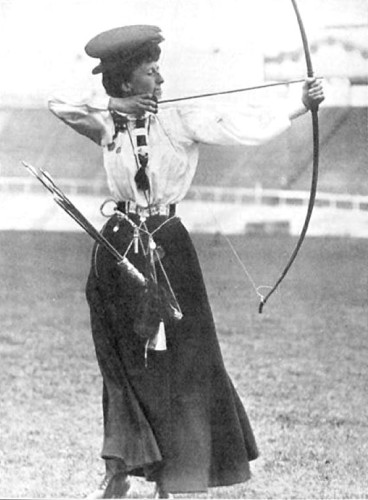RIO DE JANEIRO – This week the world has turned its attention to famous Brazilian city of Rio de Janeiro as it has become the host of the 2016 summer Olympic Games and the first South American city to stage the “biggest show on earth.” The games opened officially in Maracana Stadium Friday with traditional Olympic ceremony, as well as a spectacle showcasing Brazilian history, religion and culture
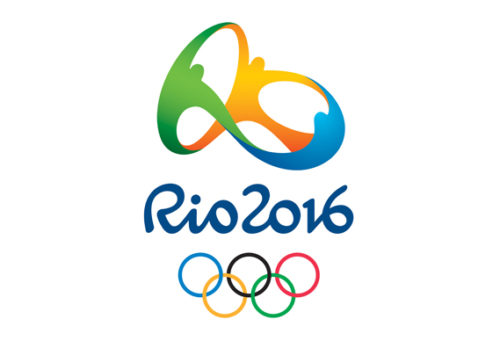
Since the location was announced and event plans executed, the Rio games have generated controversy, concerns and outrage, which included obstacles created by a downward turn in the Brazilian economy, and reports of political corruption and instability. The infamous Zika virus, which continues to plague the South American continent, caused a number of athletes, most notably the world’s top golfers, to completely pull out of competing in the Rio games. Other issues concern poor infrastructure, inadequate security measures, crime and life-threatening pollution of the local waters. And finally, one of the biggest concerns has cycled around the serious toll that event production has had on the Brazilian people themselves, which has included mass evictions.
As if that was not enough, the opening ceremonies itself ignited more backlash as producers directly confronted, through performance art, several problems facing humanity as a whole. These included climate change, violence, and the many growing divides between the world’s peoples.
This is not the first time that an Olympic event, winter or summer, has found itself at the epicenter of sociopolitical- or economic-based problems. Being a true world stage, the modern Olympic Games generates a spotlight serving to highlight both the very best and the very worst in humanity. Over the Olympics long history, we have seen religious extremism and racism in its ugliest forms as well as well as intense spiritual devotion and personal triumph from single athletes raising their victory medals. The Olympics can both horrify and inspire.
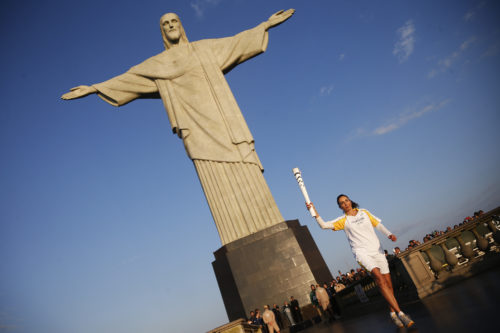
05/08/2016 – Olympic Torch Relay for the 2016 Rio Games. [Photo Credit: Rio2016/Fernando Soutello]
The Ancient Games
Religion and politics weren’t always simply a sideshow at the opening ceremonies games, relegated to individual or community expression; nor were they simply a catalyst for Olympic controversy and distraction. It is believed that the Olympics themselves began as a sacred religious rite to honor Zeus. According to the Tufts University Perseus Project:
The games were held in honor of Zeus, the king of the Greek gods, and a sacrifice of 100 oxen was made to the god on the middle day of the festival. Athletes prayed to the gods for victory, and made gifts of animals, produce or small cakes, in thanks for their successes.
During the games a truce was established that allowed for the safe travel for worshipers, athletes and spectators. While the truce didn’t end wars, it served as a damper. And, over time the sporting event grew into a major athletic competition, attracting people from all over the ancient world.
In Hellenic society, the lines between religion and politics were not so clearly drawn as they are today, and interactions between these areas of life happened more fluidly. Dr. Gwendolyn Reece, an Associate University Librarian and Director of Research, Teaching, and Learning for American University, said, “Our distinctions now of sacred and secular are coming out of our modern history and generally do not apply to the ancient Hellenic world.”
Reece, who is also a Witch and Hellenic priestess devoted to Athena and Apollon, noted that the word “politics” comes from the Hellenic work “polis,” translated as “city-state” but meaning community. She said, “When Aristotle says that a human is a political animal, what he means is that we, as humans, naturally organize ourselves into communities that are larger than the family.”
“One of the things that I find deeply interesting and significant as an American is the way in which ancient Hellenic Pagan culture navigated the relationship between individualism and communalism,” explained Reece. “In many ways, the Olympic Games is one of the areas in which you can see this creative tension and interplay between these two commitments.”
This interplay between politics, religion and sports find its roots not only in the ancient tradition of the Hellenic games, but in the philosophical underpinnings of the ancient society in which they were born. Reece said, “The Hellenic ideal embraces the notion that in order to live a good human life, an individual must pursue areté, which is often translated as ‘virtue’ but more appropriately could be considered the pursuit of excellence. The highest goal of a human life is to strive as strongly as one can to fully embody your perfected human nature.”
This goal applies directly to Olympic athletic competition. Reece went on to say, “This kind of striving is not only something one does for your own glory, but an individual does this also to honor the gods by striving to be as like them as possible.” In that way, the ancient games were a competition for self and for country, as well as an offering to the gods. The games were both religious and political.
While these ancient offerings, regardless of the purpose, may have included animal sacrifice, food and drink, vegetables and flowers, prayers and hymns, it was the athlete’s own risk and commitment that were an essential aspect of the overall process. At the same time, as Reece explained, “an individual can only take these risks and develop excellence through the sacrifice of his/her whole community,” which included people such as trainers, family, food growers and more. The religious act is one of the polis.
Reece went on to say, “The community released the athlete and his team from other duties so that he could train and maintain focus. He was not just presenting himself and his own excellence for competition; he was standing for his whole polis as the best his community could offer and his individual glory was also their communal glory.”
“The idea that the effort a human being gives to pursue excellence is a sacred act and a community’s effectiveness in supporting an individual human’s pursuit of excellence is profound,” Reece described, “and one of the most powerful ways to honor the gods.”
While the ancient games were rooted in the commitment to the gods and community, they were not free from greater political manipulation and strife. Reece explained that the games, in many ways, were used as a way to define who was and wasn’t Hellenic. “Only Hellenes could compete,” Reece said. “When the Dorian kingdom of Macedonia was ascending to power, its rivals tried to undermine them by proclaiming that they were not ‘really’ Hellenic.” However, the Macedonians were allowed to compete in the games, and as Reece said, “Philip II won the horse-race on the day that his son, Alexander the Great, was born.”
When Greece lost its political power, the Roman Empire kept the Olympics Games alive, and over time the ancient games developed into a more secular event. However, its Pagan origins were not easily forgotten, causing the demise of the ancient games. The Perseus Project explains:
Once the Roman emperors formally adopted Christianity, they discouraged and eventually, outlawed old “Pagan” religious practices. Since the Olympic Games were first and foremost a religious celebration in honor of Zeus, they held no place in the Christian empire. The emperor Theodosius I legally abolished the games in 393 or 394 A.D.
The Olympics were born as a Pagan religious ritual and were eventually banned for that very same reason. By 393 A.D., the games were gone … more or less.
Toward a Rebirth
According to Frank Deford of the Smithsonian magazine, there is historical evidence that small, local Olympic-style games were played around the world for many years. Some even used the name Olympics. For example, in Cotswald, England, a Roman Catholic staged an elaborate Olympick games to counter the “dour Protestantism of the time.”
Then in 1865 Pierre de Coubertin, founder of the modern games, traveled to Much Wenlock, England where William Penny Brookes had been holding local games for years. Together both men aimed to bring back the romance and glory of the ancient event. After much negotiation, Athens became the first host city for the modern Olympiad in 1896. The games were held in the fully restored ancient panathenaic stadium and the marathon was added to honor ancient Greece.
The subsequent Olympics in Paris (1900) and St. Louis (1904) were largely disappointments. Needing to bolster more support and publicity for the cause, Coubertin looked to the Olympics’ roots and asked Rome to be the fourth host city. Unfortunately Mount Vesuvius erupted in 1906 which ended that country’s bid. In 1908, London took up the reins and hosted the fourth modern Olympic Games. Deford writes, “All else had been prelude only now had the modern Olympics truly begun.”
The Modern Games
Although the games’ original religious focus had not been resurrected alongside the showcase of athleticism, the modern games were not without religious influence. According to USA Today, De Courbin himself said, “The first essential characteristic of the Olympics, both ancient as well as modern, is to be a religion above and outside the churches.” Additionally, several Olympic mottoes were coined by clergy such as “citius, altius, fortius” (faster, higher, stronger.)
Despite this joyful return, the political reality of faith-based conflict would eventually find its way into the Olympic spotlight. For example, at the 1936 Berlin games, Hitler outlawed German Jewish athletes from participating. The games were canceled in both 1940 and 1944 due to the Second World War. In 1972, 11 Israeli athletes and coaches were held hostage by Palestinians at the Munich Games. This standoff ended in the death of all 11 Israelis and five of the Palestinians. Then in Atlanta in 1996, an Army of God fundamentalist detonated a bomb in a crowded Centennial Olympic Park.
Fortunately the more violent conflicts are few and far between. However, national political conflict, even absent of religion, has found its way into game play, as it did in ancient times. For example, as a reflection of the ongoing Cold War, the U.S. Olympic team staged a boycott of the 1980 summer games held in Moscow and, four years later, the Soviet team retaliated doing the same for Los Angeles games. North Korea boycotted the 1988 games held in Seoul, South Korea. The country of Georgia protested the winter games held in Sochi, Russia. These are only a few examples.
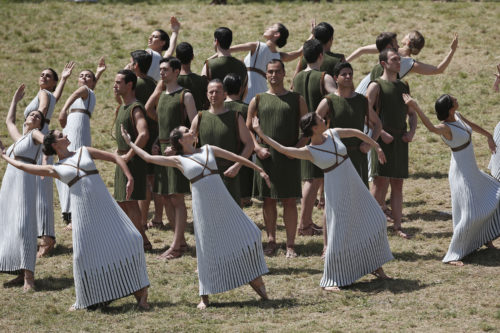
Dress rehearsal for the 2016 Torch Lightening Ceremony in Greece. Presentation of the Priestesses. [Photo Credit: Rio2016/Andre Luiz Mello]
Despite the continued complaints and allegations directed at Rio’s Olympic committee, the 2016 games has already attempted to spotlight that diversity, demonstrating that the world sporting event can serve as a voice against all odds, a call for peace, and a showcase for diverse cultures. Along with Rio de Janeiro being the first Olympic city in South America, the International Olympic Committee, with help of various nation sponsors, created a Refugee Team, made up of athletes who have been displaced from their own countries. The team consists of members from the Democratic Republic of the Congo, Syria, South Sudan, and Ethiopia.
IOC President president said, “This will be a symbol of hope for all the refugees in our world, and will make the world better aware of the magnitude of this crisis. It is also a signal to the international community that refugees are our fellow human beings and are an enrichment to society.”
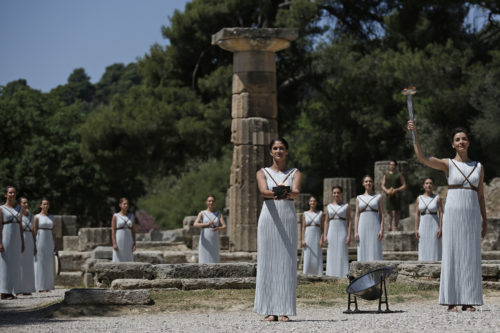
2016 Olympic Torch Ceremony at the Temple of Hera in Greece [Photo Credit: Rio2016/Andre Luiz Mello]
Reece added, “That doesn’t mean that we necessarily get along or agree with other nations, but it helps expand our notion of connection and identity because the type of excellence we see in a runner, for example, is not different based on nationality, race, creed or any other division. It is the excellence of a human who is a runner. In that way, I think [the modern games] have a strong continuity with the ancient games.”
While direct aspects of the Hellenic religion are mostly muted or completely removed from the modern games, we are reminded of those origins through various Olympic rituals, including the torch ceremony, which begins at the Temple of Hera in Greece, or in the athletes’ march in the opening ceremony, which is led by Greece. Yet, at the same time, the very spirit found in those ancient games, stemming from ancient sociopolitical and religious ideals, are still very much alive in the modern event. We can find this spirit in the athletes, as they stand on the winners’ podiums receiving their victory medals, or in the many personal stories of individual and family sacrifice.
It is on this world stage where we witness politics, religion, and sport merge and intermingle, for better or worse. And, within that intersection, just as it was in Hellenic society, the individual athletes, who strive and sacrifice, stand as champions and as inspirations for themselves, for their polis and the greater cosmopolis.
The Wild Hunt is not responsible for links to external content.
To join a conversation on this post:
Visit our The Wild Hunt subreddit! Point your favorite browser to https://www.reddit.com/r/The_Wild_Hunt_News/, then click “JOIN”. Make sure to click the bell, too, to be notified of new articles posted to our subreddit.
